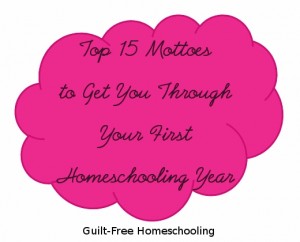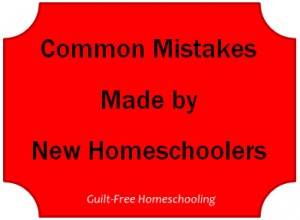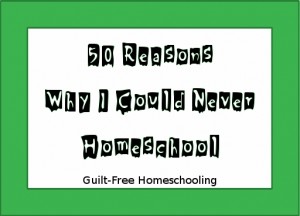 I have said it before, and I will say it again: the first year of homeschooling is the toughest. No matter who you are, no matter what background you have, no matter what ages your children are, the first year of homeschooling is the most challenging, simply because it is uncharted territory, both for you and for your students. You are understandably nervous.
I have said it before, and I will say it again: the first year of homeschooling is the toughest. No matter who you are, no matter what background you have, no matter what ages your children are, the first year of homeschooling is the most challenging, simply because it is uncharted territory, both for you and for your students. You are understandably nervous.
Because of that, I am sharing these articles from the archives of Guilt-Free Homeschooling, just for you, Brand New Homeschooling Parent. (Homeschooling “veterans” are allowed to read them, too.) Read them as often as you need the encouragement. Recite the titles as your own personal mottoes as often as you need the reminders. Copy the titles onto note cards and tape them to your bathroom mirror or your kitchen cabinet doors. Shout them as declarations of defiant resistance to the voices that would challenge your ability to teach your own children effectively. Hold your head high and your shoulders back, knowing that you are making a positive difference in your children’s lives. And know that I am very proud of you!
Who Taught This Kid to Walk, Talk, and Potty? (You, did, Mom, that’s who!)
What Didn’t Work for Today Can Be Changed for Tomorrow (Homeschooling is infinitely flexible.)
Every Day Is a Learning Day, and Life Is Our Classroom (Again, homeschooling is infinitely flexible.)
I Give One Grade: 100% — But You Get to Keep Trying Until You Get It (for as long as it takes, because homeschooling is flexible)
“Family” Is Spelled T-E-A-M (Your children are not your enemies. You are all on the same side, and they are your teammates.)
You and I Drive Different Cars (and teach our children in different ways)
Who Wrote This “Rule Book” and Why Do I Feel I Have to Follow It? (The Official Omnipotent Homeschooling Rule Book does not exist!)
“Parent” Is a Verb (Who’s in charge here anyway?)
Any Dead Fish Can Float Downstream (And anything worth having is worth working for.)
We’re Not Raising Children — We’re Raising Adults (What is your desired outcome?)
Classic Literature Is Not Necessarily Good Literature (Who decides which books are better than others?)
Knowing How to Find the Answer Is the Same as Knowing the Answer (Where in real life are you required to know everything at every given moment?)
If You Can Present Your Case with Facts and Logic and Without Whining, I Will Listen with an Open Mind (Negotiation is an excellent skill to possess.)
Your Children Will Not Always Be Like This (I promise.)
Do the Best Job You Can, and Pray for God to Clean Up the Rest (No one can expect you to do better than “your best.”)






 Guilt-Free Homeschooling is the creation of Carolyn Morrison and her daughter, Jennifer Leonhard. After serious disappointments with public school, Carolyn spent the next 11 years homeschooling her two children, from elementary to high school graduation and college admission. Refusing to force new homeschooling families to re-invent the wheel, Carolyn and Jennifer now share their encouragement, support, tips, and tricks, filling their blog with "all the answers we were looking for as a new-to-homeschooling family" and making this website a valuable resource for parents, not just a daily journal. Guilt-Free Homeschooling -- Equipping Parents for Homeschooling Success!
Guilt-Free Homeschooling is the creation of Carolyn Morrison and her daughter, Jennifer Leonhard. After serious disappointments with public school, Carolyn spent the next 11 years homeschooling her two children, from elementary to high school graduation and college admission. Refusing to force new homeschooling families to re-invent the wheel, Carolyn and Jennifer now share their encouragement, support, tips, and tricks, filling their blog with "all the answers we were looking for as a new-to-homeschooling family" and making this website a valuable resource for parents, not just a daily journal. Guilt-Free Homeschooling -- Equipping Parents for Homeschooling Success!

Recent Comments